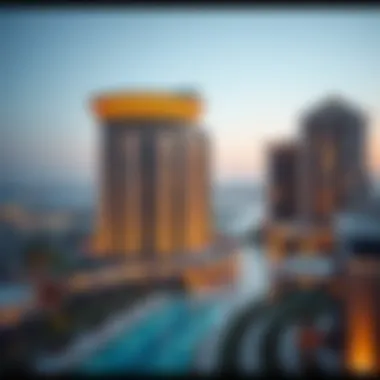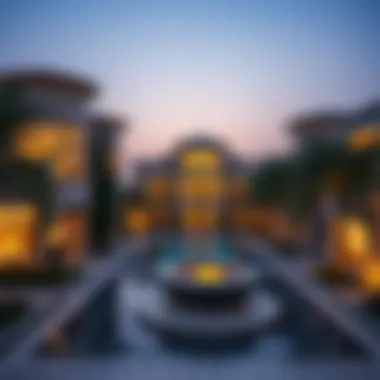Exploring the Dubai Real Estate Market for Lifelong Homes


Intro
Dubai's real estate market isn't just booming — it's a cultural phenomenon. With a rapidly changing skyline, the city offers a mosaic of properties framed by luxury and ambition. This article navigates the intricate layers of the Dubai real estate landscape focusing on the concept of "homes for life." Whether you're an investor eyeing opportunities or a potential homeowner seeking a slice of paradise, understanding this market is essential to making informed decisions.
The allure of Dubai extends beyond its breathtaking architecture and abundant sunshine. This unique territory caters to a diverse clientele, ranging from expatriates to eager investors drawn by the promise of a lucrative return. However, one must also be savvy to local trends, market shifts, and investment strategies to successfully navigate this dynamic space.
As we delve deeper, we'll uncover the current market conditions, highlight prime areas ripe for investment, and offer useful tips tailored for buyers and investors alike. The aim here is not just to skim the surface, but to provide a detailed and comprehensive guide that serves as a crucial resource amidst the rapidly evolving properties of this vibrant market.
Prelims to Dubai's Real Estate Market
Dubai's real estate market is more than just a collection of towering skyscrapers and luxurious villas; it represents a unique blend of culture, investment opportunity, and modern living. As this city continues to grow at a rapid pace, understanding its real estate landscape becomes increasingly significant not just for investors, but for anyone looking to find a home in this vibrant locale.
With world-class infrastructure and a tax-free environment, Dubai attracts a diverse array of potential homeowners, investors, and expatriates. The simple truth is, whether you're planning to invest or to settle here, grasping the undercurrents of the local real estate market is essential. The sands of this desert metropolis are constantly shifting, and keeping abreast of market trends can make all the difference.
Understanding the Real Estate Landscape
The real estate landscape in Dubai is a mosaic of various property types, ranging from high-end apartments on the shores of the Arabian Gulf to sprawling villas in gated communities. In recent years, Dubai has established itself as a hub for luxury living, drawing affluent buyers and expats in search of modern amenities and a lavish lifestyle.
The level of growth and innovation in this market is noteworthy. Developers have launched eye-catching projects that not only shape the skyline but also redefine luxury standards. Properties like the Burj Khalifa and the Palm Jumeirah signify the extent of ambition embedded in Dubai's identity. Such projects highlight a continuous push in architectural ingenuity, making it a focal point for real estate investors globally.
Moreover, the legal framework surrounding property ownership stands out. Knowing the intricacies of freehold and leasehold properties is crucial for anyone eyeing a slice of this market. While freehold properties allow buyers to own the land their homes sit on, leasehold arrangements, common in certain areas, can sometimes leave prospective residents in a grey zone regarding long-term ownership.
Significance of 'Homes for Life' Concept
The 'homes for life' concept reflects a transformative vision for living spaces, suggesting that residential properties should enhance a lasting quality of life for their inhabitants. In Dubai, where the blend of cultures and lifestyles is rich, this concept becomes even more relevant. It invites stakeholders to evolve their expectations of what homes should represent.
A home in Dubai is not merely a roof over one's head—it embodies aspirations, comfort, and community. Investors often scout for properties that resonate with this ethos, seeking not just a transaction but an enduring relationship with their environment. Properties designed with lifestyle and community in mind—proximity to schools, healthcare facilities, leisure options, and workplaces—grow in importance.
"In Dubai, finding the right home is a journey that goes beyond financial gain; it’s about nurturing a quality of life that keeps you rooted."
The alignment of these residential philosophies with modern urban planning indicates the shifting considerations of contemporary buyers. The concept of investing in 'homes for life' urges property developers to infuse their projects with amenities that not only allure buyers but also foster a genuine sense of belonging. This symbiotic relationship between residents and their abodes defines the ethos of Dubai's thriving real estate market.
The Appeal of Dubai's Property Sector
Dubai has carved out a unique stance in the global real estate market, drawing in investors from all corners of the globe. The appeal of this sector is multifaceted, encompassing a variety of elements that both seasoned investors and first-time home buyers find appealing. Understanding these elements is critical, especially when one considers the long-term implications of buying property in such a vibrant city.
Economic Stability and Growth
One cornerstone of Dubai's real estate sector is its economic stability. Despite fluctuations that periodically affect global markets, Dubai has shown considerable resilience. The strategic initiatives by the Dubai government to diversify its economy beyond oil revenues have seen success, ballooning the importance of tourism, technology, and finance. The introduction of various free zones and incentives for business has further accelerated growth. Investors are drawn to Dubai not just for immediate returns, but for long-term capital appreciation.
A few notable points in favor of investing here include:
- Tax Benefits: There are no property taxes or capital gains taxes in Dubai, making it an attractive investment destination.
- Strong Rental Yields: The rental market is lucrative. On average, property owners in Dubai can expect to see yields around 7% or even higher in prime locations.
- Infrastructure Development: Continuous investment in infrastructure, including public transport and utilities, means properties are likely to appreciate in value as the area develops.
These factors contribute to a steeming demand for properties, which keeps the market buoyant even in volatile conditions.
Cultural Diversity and Lifestyle
Cultural diversity is another significant appeal of Dubai's property sector. The city is home to over 200 nationalities, which fosters a unique blend of cultures and lifestyles. This rich tapestry not only makes Dubai a vibrant and exciting place to live but also attracts international investors looking for a cosmopolitan atmosphere.
When discussing culture and lifestyle, here are a few points to ponder:
- Global Events and Festivals: From the Dubai Shopping Festival to the Art Dubai event, the city hosts numerous international gatherings that enhance its appeal.
- Luxurious Amenities: Residents enjoy access to world-class amenities, from lavish shopping centres to extraordinary dining options and recreational facilities.
- Community Living: Many new developments emphasize community features, allowing residents to engage and form connections within this melting pot of cultures.
In the end, one cannot overlook how lifestyle elements augment the attractiveness of investing in Dubai real estate. With its mix of luxury, culture, and business, it’s almost like a glowing beacon for those looking for places to call home or to invest in property.
Investment Opportunities in Dubai
The investment landscape in Dubai is as vibrant as the city itself. For individuals interested in real estate, the allure of Dubai is hard to resist. The opportunities available are multifaceted, ranging from luxury high-rises to affordable family homes. This section delves into why investing in Dubai's property market can be a game changer for potential investors.


Investors benefit from a unique blend of tax incentives, economic stability, and a steadily growing population. In a city where glittering skyscrapers dot the skyline, making an informed decision can set investors apart and ensure profitable returns.
"With the right knowledge and strategy, Dubai real estate can offer yields that are hard to find elsewhere in the world."
Identifying High-Return Areas
When it comes to maximizing returns, location is king. Areas like Dubai Marina and Downtown Dubai are perennial favorites, known for their luxury developments and breathtaking views. Meanwhile, neighborhoods such as Jumeirah Village Circle (JVC) and Dubai Sports City are attracting significant interest due to their affordability and community-centric designs. Identifying these high-return areas is key for anyone looking to invest in Dubai real estate.
- Dubai Marina: An iconic location perfectly positioned along the waterfront, offering high-end apartments that cater to both investors and expatriates.
- Downtown Dubai: Home to The Burj Khalifa and The Dubai Mall, this area is not just a tourist destination but also a sought-after locale for luxury living.
- Jumeirah Village Circle (JVC): A favorite among families, this community offers a mix of affordability and quality of life that makes it appealing to long-term tenants.
- Dubai Sports City: Growing rapidly, this area is promoting a lifestyle that combines sports with community living, making it a good bet for rental yield.
Spotting these hotspots requires diligent research and a finger on the pulse of market shifts. Investors are advised to study rental trends, pricing dynamics, and upcoming developments to get a clearer picture of potential returns.
Emerging Market Trends
Keeping an eye on market trends can give investors a significant edge. Currently, Dubai's real estate market is witnessing a few exciting trends. First, there has been a noticeable shift towards sustainability. Developments are now being designed with eco-friendly materials and energy-efficient systems that not only appeal to a growing demographic but also promise long-term cost savings.
Additionally, there is an uptick in interest towards off-plan properties. Buyers are rushing to secure deals on under-construction units at favorable prices. This trend is fueled by the potentially higher returns when the properties are completed and prices appreciate.
- Sustainability: Eco-friendly designs are not just trends; they are becoming necessities. Properties are incorporating smart home technologies that reduce energy consumption.
- Off-plan Sales: The advantages of buying before construction often include lower prices and greater choice of units, attracting savvy investors.
The landscape is continuously changing, meaning that seizing the right moment can make a significant difference. Monitoring these emerging trends will equip investors with the insights needed to navigate this dynamic market successfully.
Luxury Developments: A Closer Look
The real estate market in Dubai is not just about the bricks and mortar; it's about the lifestyle that these luxury developments promise to deliver. Understanding luxury properties provides vital insights into various elements influencing buyer preferences and investment strategies. The luxurious nature of these properties often translates into higher returns for investors and a significant draw for affluent buyers from around the globe. Let’s delve deeper into some of the standout luxury developments and the sustainable practices shaping this sector.
Iconic Projects Shaping Dubai
When one thinks of luxury real estate in Dubai, certain projects spring to mind. These aren't just properties; they are landmarks that epitomize opulence and sophistication. Among these icons are:
- Burj Khalifa Residences: Living in the world’s tallest building isn’t just a bragging right. The residences offer panoramic views of the city and luxurious amenities that include a swimming pool, fitness center, and access to five-star dining.
- Palm Jumeirah Villas: Nestled amidst the glittering waters of the Arabian Gulf, these villas boast private pools and beach access. This iconic artificial archipelago has become synonymous with luxury living.
- Dubai Marina Towers: The breathtaking views of the marina coupled with high-end retail and dining options make this location immensely attractive. Residents enjoy a vibrant lifestyle, complete with luxury boats and yachts at their doorstep.
These projects not only symbolize wealth but also contribute significantly to Dubai’s economy through tourism and international investment. As the skyline evolves, so too do these iconic structures, embodying futuristic designs and luxurious lifestyles.
Sustainability in Luxury Living
The conversation around luxury living in Dubai is increasingly intertwined with sustainability. As the world shifts toward eco-consciousness, luxury developments are rising to the occasion by integrating sustainable practices. Key considerations include:
- Energy Efficiency: New developments are often constructed with energy-efficient technologies. For instance, properties equipped with solar panels or energy-saving appliances lead to reduced utility costs and a smaller carbon footprint.
- Green Spaces: Incorporating parks, gardens, and community spaces within luxury developments enhances aesthetics and promotes wellness. These green areas serve as valuable communal spots for harmony and tranquility amid the buzzing city.
- Water Management: Effective water management systems are critical in desert climates. Luxury properties often feature water recycling systems, landscaping that uses drought-resistant plants, and smart irrigation systems.
Sustainability in luxury living is not just a trend; it's becoming a defining feature of Dubai’s property sector. Those investing in these developments gain not only a luxurious home but also a forward-thinking investment that aligns with global efforts toward a more sustainable future.
As luxury real estate continues to flourish in Dubai, the balance between opulence and responsibility will shape the direction of the market.
Navigating Property Management in Dubai
Property management in Dubai holds a pivotal role in ensuring smooth operations within the intricate real estate landscape. As the market burgeons with diverse options, both local and expatriate investors find themselves navigating a myriad of choices. For potential homeowners or property investors, understanding property management means understanding how to maintain value and ensure a profitable return on investment. It’s not just about owning a piece of property; it’s about maximizing its potential.
Whether you are an expat looking to settle down or an investor hoping to reap rewards, the choice of property manager can significantly influence your experience. An adept property manager not only handles the day-to-day operations but also acts as a bridge to the local market, enhancing your understanding of its nuances. They can help you avoid potential pitfalls, cut through the confusion of local laws, and ensure your property is managed efficiently and effectively.
Choosing the Right Property Manager
Choosing the right property manager can feel like finding a needle in a haystack, especially in a lively market like Dubai’s. To make the best choice, start by considering several key factors:
- Experience and Expertise: Look for managers who have a strong track record in Dubai's real estate landscape. Their knowledge of the local market will give you an edge.
- Reputation: Recommendations and reviews from other landlords can provide invaluable insights. It's vital to trust your property in the hands of someone who has proven they deliver.
- Services Offered: Different managers offer variable services. Some may focus solely on rent collection, while others provide full management, including maintenance and tenant relations. Decide what fits your needs best.
- Technology Use: A savvy property manager should leverage technology to enhance efficiency. Property management software that tracks payments, schedules maintenance, and communicates with tenants simplifies your role.
Finding the right fit means not simply choosing a manager but establishing a partnership that aligns with your goals and expectations. Don’t shy away from asking questions; clarity upfront can save you headaches down the road.
Legal Considerations in Property Management


Engaging a property manager in Dubai brings along certain legal considerations that cannot be overlooked. Understanding these factors is crucial for both compliance and peace of mind. Important aspects include:
- Rental Laws: Familiarize yourself with the local rental laws that govern landlord-tenant relationships in Dubai. Knowing your rights and obligations is essential.
- Property Laws: Ensure that any agreement with the property manager respects both your rights and local regulations. It’s advisable to have these contracts reviewed by a legal expert.
- Licensing: Make sure your property manager is licensed and complies with the Real Estate Regulatory Agency (RERA) legislation. This helps ensure the legitimacy of their operations.
- Insurance Needs: Proper insurance coverage is a must. Make inquiries about what’s needed to shield yourself from potential liabilities.
“Navigating property management in Dubai without understanding legal aspects is akin to sailing without a compass.”
By being proactive and informed, investors can foster a property management environment that benefits both parties involved. Aligning business objectives with best practices can lead to not only successful property operation but also enhanced investment outcomes.
The Role of Technology in Real Estate
The ever-evolving landscape of technology has fundamentally changed the real estate industry in Dubai. The integration of technology into property buying and selling processes has become essential, offering significant advantages for investors, agents, buyers, and expatriates. Understanding these changes is crucial for making informed property decisions.
Digital Platforms for Property Listings
Today, the traditional methods of property advertising are quickly falling by the wayside. Digital platforms have revolutionized how real estate listings are shared and accessed. Websites and applications such as Property Finder, Dubizzle, and Bayut host a remarkable variety of properties, offering easy navigation and precise search options. Some platforms even incorporate filters that allow users to refine their searches according to specific criteria, such as price range, property type, and location.
With a few clicks, buyers can explore thousands of listings, complete with images and detailed descriptions. This immediacy has shaped buyer behavior, making them more informed and decisive. Here are some key benefits of these digital platforms:
- Accessibility: People can browse listings from anywhere at any time, eliminating the need for physical visits to real estate agencies.
- Comprehensive Information: Listings often come accompanied by neighborhood information, market trends, and even school ratings.
- User-Friendly Interfaces: Most platforms focus on ease of use, catering specifically to the needs of both buyers and sellers.
Considering that many buyers begin their property searches online, these platforms serve as pivotal tools, bridging the gap between consumers and the real estate market.
Impact of Virtual Tours
Virtual tours have taken the online property experience to a whole new level, providing a dynamic approach to property viewings. Given Dubai's diverse population, many potential buyers might be overseas or unfamiliar with the local property scene. Here, virtual tours become invaluable. They offer a realistic and immersive way to experience a property without needing to be physically present.
With technologies such as 3D imaging and virtual reality, prospective buyers can walk through homes, experiencing layouts and spatial relationships as if they were really there. This can save both time and money, as buyers can narrow down their options before committing to in-person visits.
“Virtual reality’s role in real estate is not just about fantasy; it shapes how we make reality-based decisions in property purchases.”
Some notable advantages of virtual tours include:
- Time Efficiency: Buyers save time by filtering properties effectively before any site visits.
- Enhanced Experience: The ability to view a property from different angles and perspectives appeals to buyers, creating a more engaging experience.
- Competitive Edge: Listings equipped with virtual tours can stand out more prominently, capturing interest in a crowded market.
Expatriate Considerations in Property Ownership
When it comes to navigating the lively waters of Dubai's real estate market, expatriates need to have their ducks in a row. The local laws and customs can be like a maze for those unfamiliar, making it crucial to understand the regulations and cultural ethos. Here, we will address the core elements impacting expatriate property ownership and outline the benefits and considerations that come along with it.
Regulatory Framework for Foreign Buyers
Dubai offers a relatively open and friendly environment for foreign buyers looking to purchase property. However, there are rules in place that one must know. Firstly, it’s important to note that expatriates are allowed to own properties in designated areas, generally called freehold areas. This means that these foreign nationals can buy, sell, or lease properties just like local citizens, with a few caveats.
- Documentation: Buyers will need a valid residence visa and a passport. It’s vital to ensure all documents are in order prior to initiation.
- Financing: Many expatriates opt for bank loans, which may vary based on nationality and the property's value. Getting a financial advisor familiar with local banks can prevent future headaches.
- Taxes and Fees: Buyers need to be aware of the additional costs, which may include registration fees, which usually amount to 4% of the property’s value.
This framework might seem overwhelming at first glance, but it holds a distinct advantage. With well-defined regulations and clear processes, expatriates can confidently invest in real estate, leading to both personal satisfaction and potential financial gains.
Cultural Integration in a New Home
Moving to a new country is more than just buying a house; it’s about building a life. Cultural integration in Dubai can be a rewarding experience, but it does require effort, understanding, and sometimes a leap of faith. The diverse tapestry of cultures in the city lends itself to an enriching experience, yet adapting to new nuances can be tricky.
Here are a few key points to consider:
- Community Interaction: Engaging with your neighbors or joining local expatriate groups can provide support and ease the transition. Social platforms like Facebook often have groups catering to specific nationalities, making it easier to find like-minded individuals.
- Understanding Local Customs: Familiarizing oneself with local traditions can help avert misunderstandings. For instance, greeting local customs during Ramadan or knowing the appropriate dress code during public holidays reflects respect for local norms.
- Language: While English is widely spoken in Dubai, picking up a few Arabic phrases can go a long way in showing respect for the local culture.
Ultimately, integrating into the community may take time, but building relationships can greatly enhance your living experience in Dubai. An open mindset and willingness to embrace new experiences can turn a house into a true home.
Navigating the property landscape in a foreign country can seem intimidating. However, with the right approach and understanding, expatriates can unlock the door to a fulfilling and enriching life in Dubai.
Understanding Neighborhood Dynamics


In the ever-evolving real estate landscape of Dubai, understanding neighborhood dynamics is as crucial as choosing the right property. The vibrant communities within this city are not just about square footage and price tags; they define the experience of living there. How do different areas influence property values? What lifestyle perks do they offer? These are questions every buyer, investor, or agent needs to consider when making informed decisions.
Evaluating Different Districts
Evaluating the districts in Dubai involves more than just looking at the obvious: location, location, location. Each area has its unique culture, amenities, and potential for future development. For instance, consider the differences between Downtown Dubai, known for its lush skyscrapers and bustling nightlife, and Dubai Marina, where water views and leisure activities dominate. These distinctions play a critical role in property desirability and investment potential.
- Downtown Dubai: Home to the Burj Khalifa, it's a blend of luxury and commercial vibrancy. This area attracts high-end buyers seeking a cosmopolitan lifestyle.
- Dubai Marina: Ideal for those looking for a more relaxed, beach-inspired lifestyle. The property here is often sought after by expatriates and young professionals, creating a lively community feel.
- Jumeirah: Known for its cultural richness and beachfront properties, this area exudes charm, attracting families and those desiring proximity to the sea.
- Deira and Bur Dubai: Offering historical allure, these areas are bustling with traditional markets and local eateries, appealing to those who want to experience the authentic side of Dubai.
Each district's charm contributes to the overall demographic and economic health of the area. As an investor, understanding these elements helps in making predictions about future growth and property appreciation.
Amenities and Lifestyle Considerations
The importance of neighborhoods often stems from the amenities available. Residents of Dubai seek not just houses, but homes that provide a full-throttle lifestyle. For instance, those living in Dubai Hills may prioritize parks and family-friendly spaces, while residents of the Palm Jumeirah often look for access to premium dining and luxurious leisure facilities.
Here are a few considerations that distinguish lifestyle offerings:
- Proximity to Schools: Families often look for areas with reputable schools. Neighborhoods that host popular international schools can deffinitely command higher prices.
- Transportation: Areas with easy access to public transportation can be more appealing, especially for working professionals. The Dubai Metro has made commuting a breeze for many.
- Shopping and Dining: Having a variety of dining options or shopping hubs nearby can be a game changer for many. Neighborhoods like Mall of the Emirates are increasingly desirable simply because of the lifestyle convenience they offer.
- Recreational Spaces: Access to parks, gyms, and swimming pools plays a significant role in signifying quality of life; buyers often prioritize these features when selecting a neighborhood.
"A neighborhood is more than a place; it’s a way of life. The right environment fosters happiness and belonging, unique to every individual."
By identifying these dynamics, potential property buyers can better navigate the Dubai real estate market. Understanding the neighborhood every home is situated in allows for strategic investments that align with personal or investment goals.
For further insights, consider checking resources from
Dubai Land Department or exploring real estate forums on Reddit.
Ultimately, a keen eye on neighborhood dynamics can really mean the difference between a house and a home.
The Future of Real Estate in Dubai
As Dubai continues to evolve into a global city, the future of its real estate market holds immense potential. Understanding what lies ahead offers valuable insight for investors, homebuyers, and expatriates looking to anchor themselves in this vibrant locale. The real estate sector is not immune to the beat of technological advancement, urban development, and market fluctuations. Grasping the nuances of future trends in Dubai's property landscape becomes essential for those who wish to make informed decisions about their investments and lifestyles.
Upcoming Developments on the Horizon
In the coming years, Dubai is set to witness a plethora of notable developments that can reshape its skyline and living experience. These ongoing and upcoming endeavors include:
- Expo 2020 Legacy Projects: Initially touted as the Exposition's defining attribute, the legacy of the event continues to manifest in urban projects aimed at enhancing community livability, sustainability, and tourism.
- Downtown Dubai Redevelopment: The heart of the city sees constant innovation, including the massive redevelopment of existing zones and the introduction of new mixed-use spaces, which will cater to both residential and commercial needs, allowing for seamless living and working arrangements.
- Affordable Housing Initiatives: With an increasing focus on inclusivity, the government is promoting affordable housing solutions, making the residential market accessible for a broader demographic.
- Smart City Projects: Dubai's ambition to become a smart city is gaining traction, with infrastructural projects focused on integrating cutting-edge technology into residential living spaces.
Each of these developments aligns with the broader push toward creating a future-ready city where technology, convenience, and quality of life converge. Investors will do well to keep a keen eye on these projects as they can directly impact property values and rental yields.
Predictions for Market Growth
In terms of market growth, the outlook for Dubai's real estate sector remains notably promising. Here are some key predictions:
- Continued Economic Diversification: As Dubai seeks to diversify its economy, sectors like tourism, technology, and trade will bolster real estate demand, particularly in high-traffic areas.
- Retained Expatriate Population: The expatriate community not only contributes to the city’s cultural vibrance but also plays a crucial role in the housing market. As new visa reforms attract more expatriates, the demand for housing will remain robust.
- Increased Rental Yields: Analysts suggest that rental prices may continue to rise due to the influx of both expatriates and domestic buyers. While supply may catch up in some areas, strategic hotspots could still experience significant rental growth.
- Sustainability Trends Impacting Property Values: As global emphasis on sustainability grows, developments incorporating eco-friendly features will likely command premium prices, making intelligent investment choices crucial.
"Understanding the future trends in Dubai’s real estate is not just about reacting to market changes; it's about anticipating them. A well-informed investor will not only navigate upcoming challenges but can capitalize on substantial opportunities that arise."
Closure: Making Informed Property Decisions
In the realm of Dubai's real estate, making informed property decisions holds immense significance for potential investors, buyers, and expatriates. This conclusion delves into the key elements that underscore its importance. Real estate is not just about buying a property; it's about understanding the market dynamics, cultural context, and long-term implications.
Understanding local market trends, investor motivations, and emerging neighborhoods can spell the difference between a fruitful investment and a regrettable misstep. Being armed with knowledge aids in navigating this vibrant yet challenging landscape, which is rife with opportunities and complexities.
"Knowledge is power, especially in the fast-paced world of real estate."
By carefully considering the factors that influence property values—like infrastructural developments, community amenities, and local regulations—buyers position themselves for enhanced advantages. Investors benefit from insights into demographic trends, enabling them to forecast future asks with a measure of certainty. Homebuyers can discover not just a house, but a suitable environment where families can thrive, strengthening the concept of 'Homes for Life.'
Moreover, engaging in thorough due diligence regarding legal aspects and financial commitments can help mitigate risks. The intricacies of property management, zoning laws, and the foreign buyer framework become clearer with proper research. Understanding these aspects can ultimately save time, money, and potential heartache.
Summarizing Key Insights
Reflecting on the multifaceted aspects of Dubai's real estate market reveals several key insights that enrich our understanding:
- Diverse Investment Opportunities: The market isn't confined to luxury villas; there are varied investments—from affordable apartments to high-end developments—catering to diverse preferences.
- Economic Drivers: The UAE government's vision and its initiatives to enhance tourism and business sectors are influential in sustaining property values.
- Community Lifestyle: The neighborhoods in Dubai are as diverse as its inhabitants. Appreciation for cultural integration and community dynamics is essential when choosing a location.
- Future Predictions: The market is poised for continued growth, especially with upcoming projects and infrastructural shifts that promise to enhance its appeal further.
Next Steps for Potential Buyers
For anyone looking into entering Dubai's real estate market, here are several actionable next steps to consider:
- Research Local Markets: Spend time understanding various neighborhoods. What might be booming today could differ tomorrow.
- Engage a Local Agent: Partnering with a competent local real estate agent can provide insights unattainable through online searches.
- Attend Property Tours: Experience properties firsthand to assess their quality, location, and community feel.
- Examine Financials Carefully: Determine your budget and investigate various financing options available for expatriates.
- Understand the Legal Framework: Research the rights of foreign buyers, property ownership laws, and any additional responsibilities you gotta know.
In summary, making informed property decisions involves marrying detailed research with personal preferences, ensuring not just an investment, but the foundation for a prosperous future in Dubai. This thorough comprehension ultimately equips potential buyers with the confidence to turn property aspirations into reality.











